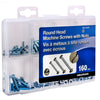Replacing your furnace filters is a crucial part of maintaining your home's air quality and ensuring your heating system runs efficiently. Over time, these filters can become clogged with dust, dirt, and other particles, leading to decreased air flow and increased energy consumption. By following this step-by-step guide, you can easily replace your furnace filters and maintain a comfortable and efficient home environment.
Why Replace Your Furnace Filters?
Regularly replacing furnace filters offers several benefits:
-
Improved Air Quality: Fresh filters trap dust, pollen, and other allergens, ensuring that you breathe cleaner air.
-
Enhanced Efficiency: A clean filter allows your HVAC system to operate more efficiently, reducing energy bills.
-
Extended Lifespan: Regular maintenance, including filter replacement, can prolong the life of your furnace.
Step-by-Step Guide to Replacing Furnace Filters
Follow these simple steps to keep your heating system in top condition:
Step 1: Determine the Right Time to Replace Your Filter
Typically, furnace filters should be replaced every 1 to 3 months, depending on the type of filter and household conditions. If you notice increased dust in your home or reduced airflow, it may be time for a replacement.
Step 2: Turn Off Your Furnace
Before you begin, ensure your furnace is turned off to prevent any accidents. You can do this by switching off the system's power at the thermostat or directly at the main power source.
Step 3: Locate and Remove the Old Filter
Furnace filters are generally found in the blower compartment, which is accessible via the air vent. Slide the old filter out carefully, taking care not to spread dust and dirt.
Step 4: Choose the Right Replacement Filter
When selecting a new filter, consider the filter’s size and type. Refer to the manufacturer's instructions or check the old filter for sizing information. You can find a wide range of high-quality furnace filters at xpartsupply.com.
Step 5: Install the New Filter
Place the new filter into the slot, ensuring it’s aligned properly according to the airflow arrows on the filter frame. This ensures that the filter works effectively.
Step 6: Turn Your Furnace Back On
Once the new filter is securely in place, turn your furnace back on. Monitor it for any unusual noises or performance issues to ensure it is operating correctly.
Step 7: Set a Schedule for Regular Replacement
Keep track of when you replace your filters and set reminders to check them regularly. This proactive approach helps maintain air quality and efficiency.
Conclusion
Replacing your furnace filters is a straightforward task that offers numerous benefits, from improved air quality to reduced energy costs. By following these steps, you can ensure your heating system operates efficiently throughout the year. For all your furnace filter needs, visit xpartsupply.com to explore a wide range of options tailored to your home.
Ensure that your family's comfort and health are top priorities by maintaining clean and efficient heating filters.







